BGI scientist praises SZ as a well-balanced city
PROFILE
人物介绍
Dr. Sunil Kumar Sahu from India has been working as a research scientist in plant genomics since 2018 at BGI Research. He praises Shenzhen as a well-balanced city which sees the harmony of man and nature, coexistence between bustling economic activities and good urban order as well as residents’ busy work and leisure time. A certified fitness coach of CrossFit, he gives free training to his students and colleagues after work.
来自印度的Sunil Kumar Sahu博士,自2018年以来在深圳华大生命科学研究院担任研究科学家。他欣赏深圳的均衡发展之美,在他看来,这里人与自然和谐相处,城市经济活动繁忙但却保持着井然有序的城市秩序,人们也都基本实现生活工作的平衡。作为一名CrossFit教练,Sahu博士会在每天下班后义务教他的学生和同事进行体能训练。
Video and photos by Lin Jianping except otherwise stated 视频、摄影:刘旭东
认识下这位印度斜杠青年!
华大基因印度籍研究科学家/CrossFit教练
In most people's eyes, Shenzhen is a young, fast-developing, high-tech, smart, innovative and creative city. While acknowledging all these traits of the city, Dr. Sunil Kumar Sahu, an Indian research scientist from BGI, praises Shenzhen as a well-balanced city which sees the harmony of man and nature, coexistence between bustling economic activities and good urban order, as well as residents’ busy work and leisure time.
在大多数人眼中,深圳是一座年轻、快速发展的、高科技的、智慧的、创新的和有创造力的城市。对此,来自华大基因的印度研究科学家Sunil Kumar Sahu博士也十分认同,只不过他更欣赏这座城市的均衡发展之美。在他看来,这里的人与自然和谐相处,城市经济活动繁忙但却保持着井然有序的城市秩序,人们也都基本实现生活工作的平衡。
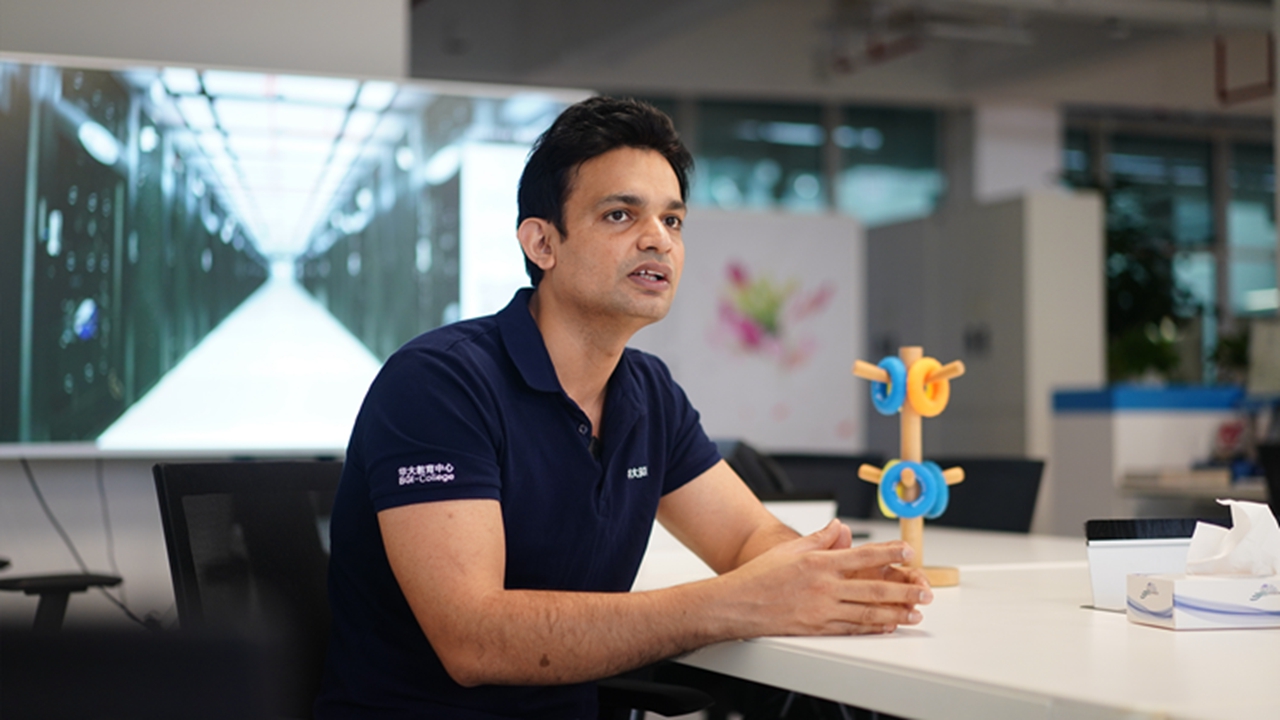
 Dr. Sunil Kumar Sahu at an interview with Shenzhen Daily.
Dr. Sunil Kumar Sahu at an interview with Shenzhen Daily.
Sunil Kumar Sahu博士接受英文《深圳日报》采访。
Dr. Sahu, who hails from a small village in Chhattisgarh, India, has been working as a research scientist in the field of plant genomics since January 2018 at the Institute of Digital Earth, China National GeneBank (CNGB), BGI Research in Dapeng New Area.
今年35岁的Sahu博士来自印度中部一个名叫恰蒂斯加尔邦的小村庄。2018年1月以来,Sahu博士在位于大鹏新区的深圳华大生命科学研究院数字地球研究所工作,担任植物基因组学领域的研究科学家。
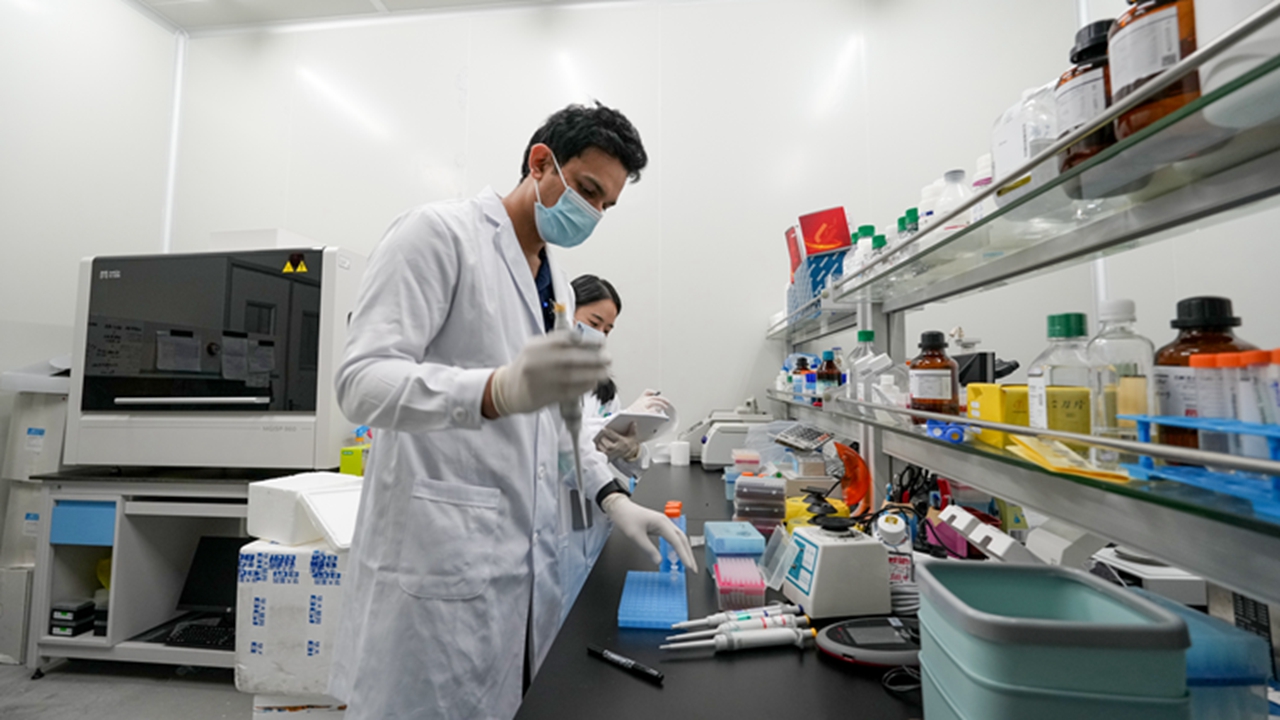
 Dr. Sahu at work.
Dr. Sahu at work.
Sahu博士工作中。
Over the past five years, Dr. Sahu has witnessed the city’s rapid development in its economy and urban infrastructures without compromising people’s livelihoods and the natural environment.
“Shenzhen is a rapidly developing city. In the last couple of years, I’ve seen a lot of progress. For example, previously there was no Metro here in Dapeng, but now I have heard that the Metro construction has already started. I also noticed many new parks are opening here in Dapeng and very beautiful walking or jogging lanes are all around the city. I think that's a significant improvement,” he said. “But on the other hand, they are also taking care of nature. If the construction is going on, they will also grow a lot of trees in other places, especially to reduce the pollution.”
在过去近五年的时间里,Sahu博士见证了这个城市在经济和城市基础设施方面的飞速发展,与此同时,居民的生活和自然环境的保护也在持续改善。“深圳是一个发展非常快的城市。过去几年,我看到了很多的进步。例如,以前大鹏新区没有通地铁,但现在我听说通往大鹏的地铁建设已经取得了新进展。我还留意到在许多新建成的公园也已经正式开放,城市各个区域都陆续开放了非常漂亮的步道或慢跑道。我认为这是非常棒的发展。” 他说。“在城市建设的同时,这座城市也没有忘记保护自然环境。比如,如果因为某一处施工而影响了植物的生长,他们就会在其他地方种植大量树木,以此来减少污染。”
Dr. Sahu gave a thumbs-up to the city government’s efforts in balancing economic growth and environmental protection. “I appreciate the city’s efforts in environmental conservation. I often share Shenzhen’s Air Quality Index with my Indian and other foreign friends, to make them aware of how nicely the top-tier city is maintaining the balance between nature and the city’s growth,” he said.
Sahu博士也点赞深圳市政府在平衡经济增长和环境保护方面所做出的努力。“深圳在环境保护方面的努力很值得赞赏。我经常把深圳的空气质量指数分享给我的印度朋友和其他外国朋友,想让他们知道,尽管深圳是一线城市,但这座城市在自然和城市发展之间的平衡保持得非常好。”
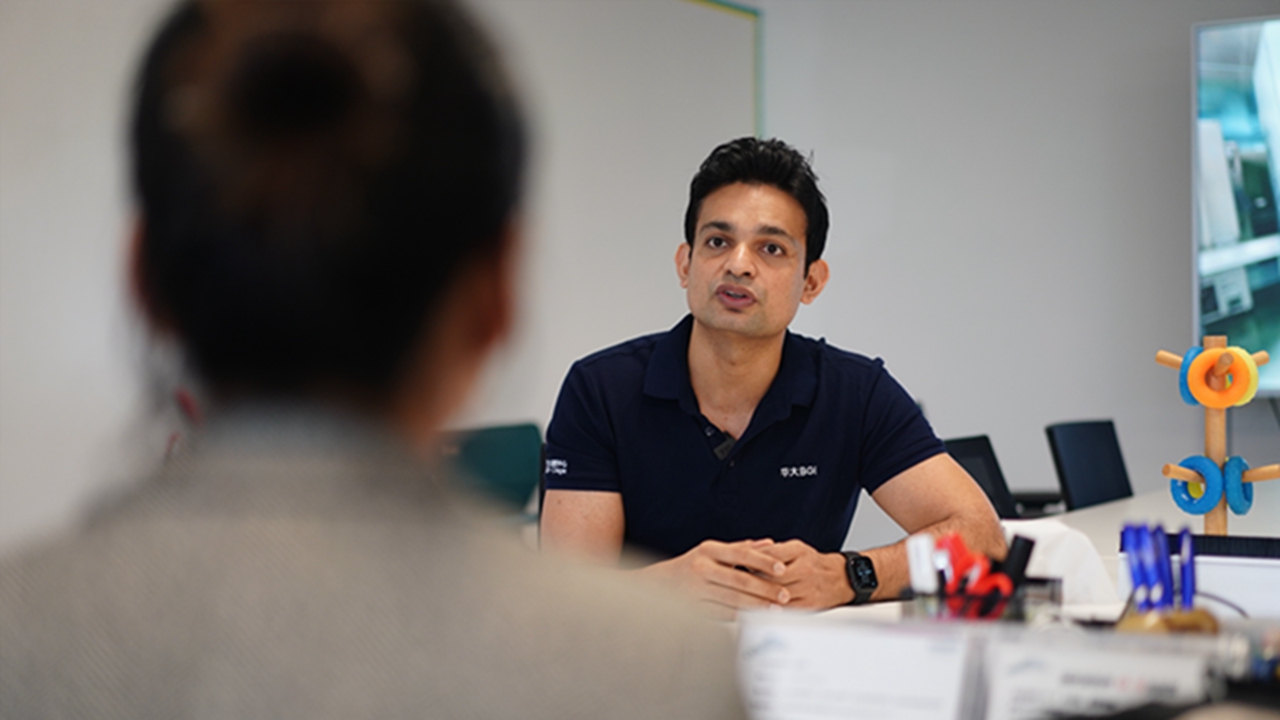
 Dr. Sahu shares with Shenzhen Daily journalists his impressions on Shenzhen.
Dr. Sahu shares with Shenzhen Daily journalists his impressions on Shenzhen.
Sahu博士与英文《深圳日报》记者分享他对深圳的印象。
The 35-year-old told Shenzhen Daily that he is impressed by the city’s excellent organization in managing traffic, rules and public services, among others. “I love not only the city’s organization, but also the fact that people follow the rules very efficiently. One thing my wife and I like the most is that whenever we are on the road and some bus or car is coming, even there is no signal, they will stop automatically, which make us feel like Chinese people are so gentle and kind,” he said.
Sahu博士在采访中称,深圳在交通秩序管理、城市规则及公共服务等方面展现出的高强的组织力令他十分钦佩。“我不仅赞扬深圳井然有序的城市秩序,也很欣赏遵守各项规则的深圳市民。我和我妻子最有感触的一点就是,每当我们过马路时,在没有信号灯的情况下,公交车或小汽车也会自动停下来,让我们先过。这让我们感受到中国人的温柔和善良。”他说。
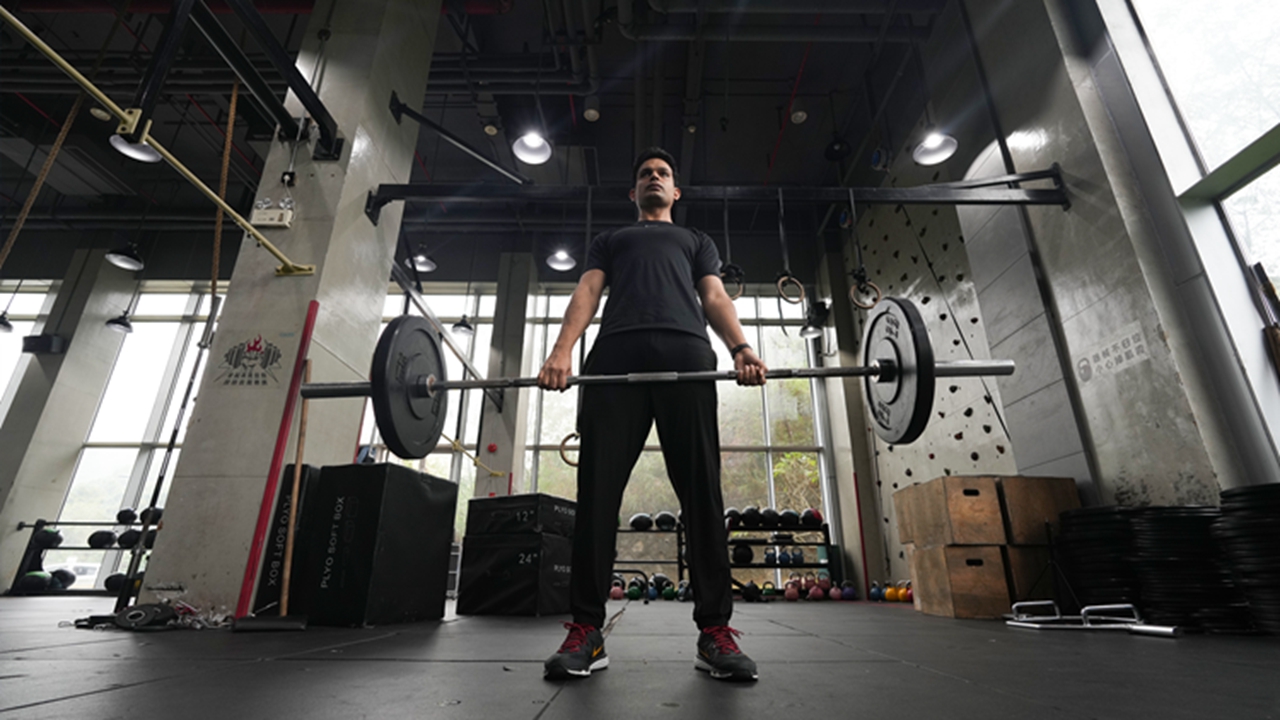
 Dr. Sahu exercises at a gym in BGI.
Dr. Sahu exercises at a gym in BGI.
Sahu博士在华大基因的健身房进行锻炼。
In the case of the Indian scientist, brain and brawn have never been enemies. Apart from his daily tasks of assembling genomes, writing research papers and interpreting data, Dr. Sahu loves hiking, going to beaches and sightseeing with his wife and BGI friends. He is also a certified CrossFit fitness coach and gives free training to his students and colleagues after work. He also mentioned that he took up a new hobby of playing badminton after coming to Shenzhen and won some awards in competitions at his institute.
这位印度科学家不仅科研能力突出,在体育运动上也展现出相当的天赋。除了从事日常工作,包括对全世界大量植物样本进行基因组组装、撰写研究论文、分析数据,Sahu博士喜欢徒步,和妻子、同事结伴一起去海边游玩。他还有另外一个身份,那就是CrossFit教练。每天下班后,他会义务教他的学生和同事进行体能训练。他还提到,来到深圳后,他爱上了打羽毛球,在公司内部组织的羽毛球比赛中屡获佳绩。
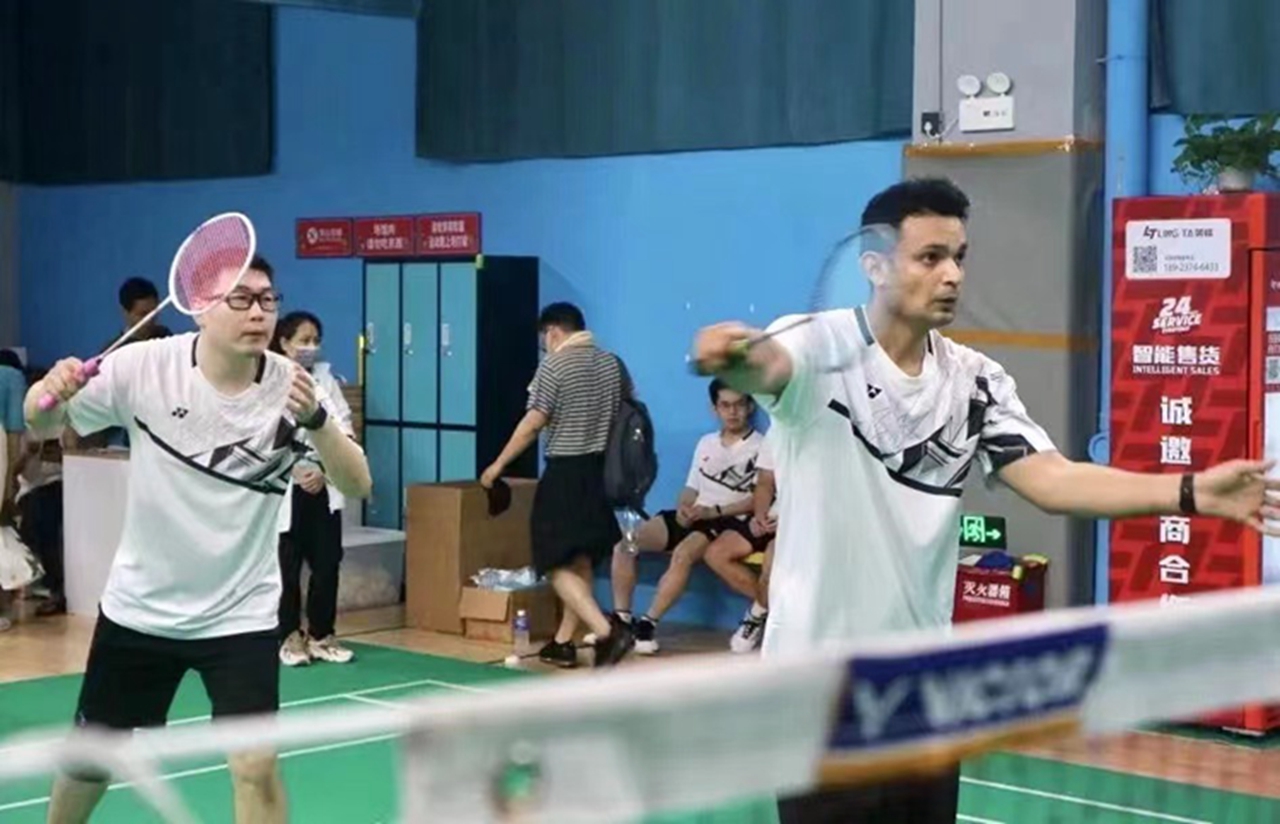
 Dr. Sahu reacts during a BGI badminton match held in December 2022.
Dr. Sahu reacts during a BGI badminton match held in December 2022.
Sahu博士和同事在一场去年十二月的华大基因内部羽毛球赛上。
He added that BGI celebrates sports and highly values its employees' health. “BGI organizes sports activities twice a year to motivate all the students and staff to come and play together. They also have some fun games like jumping rope and tug-of-war,” he said.
他补充说,华大基因为员工提供了良好的运动环境。公司十分重视员工的健康,鼓励全员健身。“华大基因每年会组织两次体育会,激励大家全体参与、共享运动的乐趣。还有很多趣味运动,如跳绳、拔河等。”他介绍道。
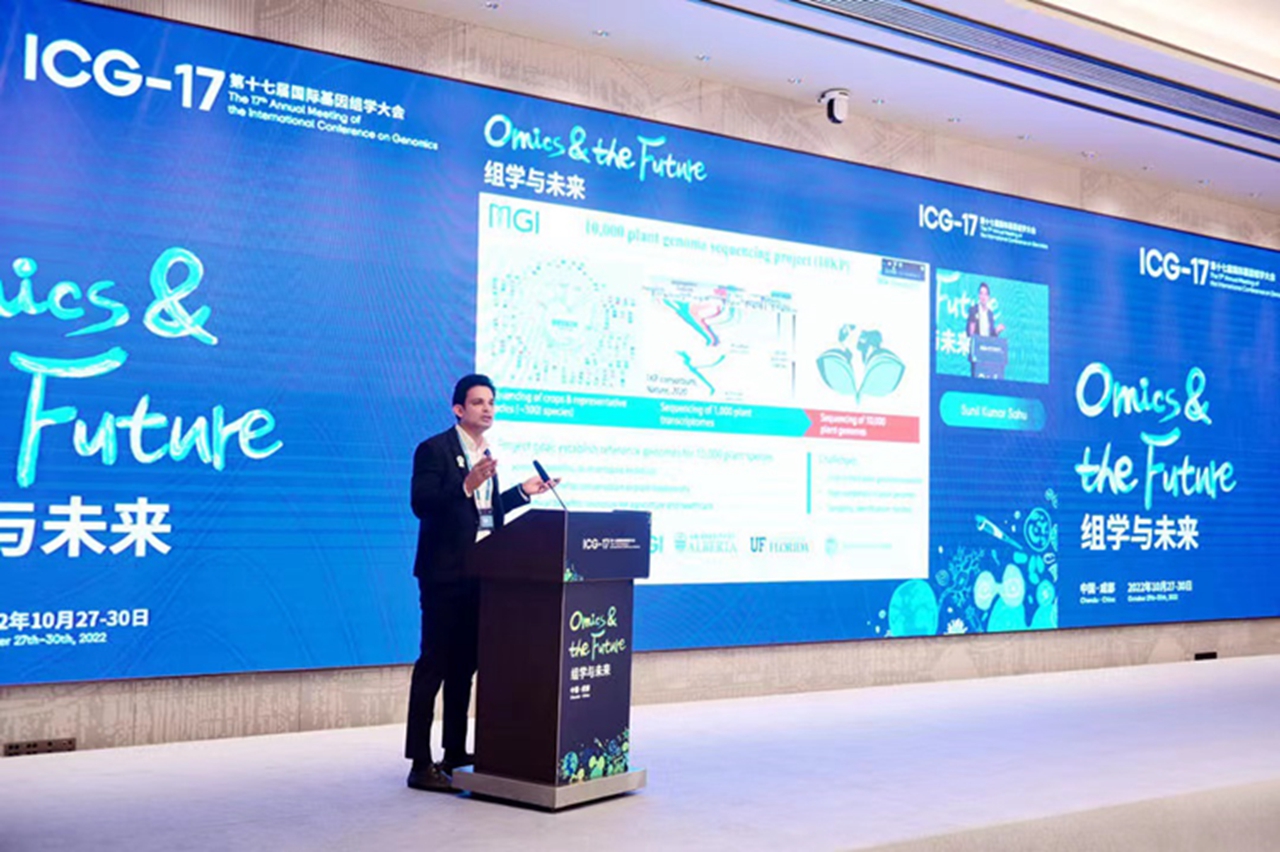
 Dr. Sahu delivers a speech at the 17th Annual Meeting of the International Conference on Genomics in November 2022 in Chengdu. Courtesy of the interviewee
Dr. Sahu delivers a speech at the 17th Annual Meeting of the International Conference on Genomics in November 2022 in Chengdu. Courtesy of the interviewee
Sahu博士在2022年11月于四川成都举办的第十七届国际基因组学大会上发言。图片由受访人提供
Dr. Sahu told Shenzhen Daily that doing research is not just his job but also his passion, which brought him from India to Sun Yat-sen University in Guangzhou in 2015 to join a postdoctoral program. While studying in Guangzhou, Dr. Sahu heard a lot about Shenzhen and during the International Botanical Congress held in Shenzhen in 2017, he was invited to visit BGI/CNGB and was amazed by the infrastructure and research facilities of BGI.
Sahu博士告诉记者,做研究不仅是他的工作,更是他的热情所在。说起和深圳的不解之缘,他提到自己在中山大学时,就曾把研究样本送到深圳华大基因进行DNA测序。在广州,他也常听一些中国朋友聊起深圳。2017年的国际植物学大会期间,他受邀参观了华大基因并且亲身体验了深圳这座城市。他表示,华大基因先进的基础设施和研究设备令他叹为观止。

 Dr. Sahu shows a plant specimen to Shenzhen Daily journalists.
Dr. Sahu shows a plant specimen to Shenzhen Daily journalists.
Sahu博士向英文《深圳日报》记者展示一幅植物标本。
In 2019 Dr. Sahu received 300,000 yuan (US$43,000) from the Shenzhen Municipal Government’s “Research Grant” and 50,000 yuan from the “Wutong Phoenix” class-D talent award. He says that financial support from the government is very helpful for early-career researchers. He thinks that the Shenzhen government is very forward-looking as they understand and believe that investment in scientific research and innovation plays a crucial role in generating innovation-based economic growth.
He also appreciates the city’s great ambition in drawing talents from all over the world. “If more talented people are coming here and give their brainstorming, knowledge and experience and train the local people, I think that will be an enormous boost for Shenzhen’s economic development and all future innovations,” he said.
2019年,Sahu博士获得深圳市政府发放的“科研资助”30万元(约合4.3万美元)和 “梧桐凤凰”D类人才奖5万元。他表示,政府的资助和支持对事业刚起步的研究人员很有帮助。他认为深圳市政府具有长远发展的眼光,因为他们意识到并相信,大力投资科研和创新对于实现创新型经济发展至关重要。他还赞赏深圳在招揽全球人才方面展现的雄心。“如果有更多的优秀人才来到深圳,展开头脑风暴,贡献出自己的丰富知识和经验,并培养出本地人才,我认为这将有力推动深圳的经济、创新发展。”